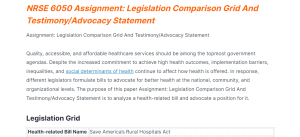Select a bill that has been proposed (not one that has been enacted) using the congressional websites provided in the Learning Resources. The Assignment: (1- to 2-page Comparison Grid; 1- to 2-page Legislation Testimony/Advocacy Statement)
Quality, accessible, and affordable healthcare services should be among the topmost government agendas. Despite the increased commitment to achieve high health outcomes, implementation barriers, inequalities, and social determinants of health continue to affect how health is offered. In response, different legislators formulate bills to advocate for better health at the national, community, and organizational levels. The purpose of this paper Assignment: Legislation Comparison Grid And Testimony/Advocacy Statement is to analyze a health-related bill and advocate a position for it.
Legislation Grid
| Health-related Bill Name | Save America’s Rural Hospitals Act |
| Bill Number | H.R.6400 |
| Description | It establishes payment modifications for rural healthcare practitioners under Medicare and Medicaid (Congress.gov, 2023). These modifications include exemption from sequestration, payment increases for some medical services in rural settings, and doing away with the 96-hour physician certification requirement. |
| Federal or State? | Federal |
| Legislative Intent | The bill’s primary intent is to ensure care continuity in rural areas. It seeks to achieve continuous service delivery by preventing the closure of rural hospitals (South Dakota Association of Healthcare Organizations, 2023). |
| Proponents/ Opponents | Representatives Sam Graves and Jared Huffman |
| None in particular | |
| Target Population | Rural populations. They need healthcare services close to them since more marginalization will increase the health disparities gap. |
| Status of the bill (Is it in hearings or committees?) | The bill is in the committees’ stage; it was recently referred to the Subcommittee on Health (Congress.gov, 2023). |
| General Notes/Comments | Rural populations deserve protection from problems that increase health disparities. The bill addresses a genuine health concern and requires massive support from legislators. Quick implementation is necessary to ensure its intended objectives are achieved the soonest as possible. |
Legislation Testimony/Advocacy Statement
Healthcare providers and the government are mandated to promote health across populations. The bill focuses on a genuine healthcare issue, and its implementation should be expedited. In the current practice, barriers to access are widespread in rural areas, including affordability problems, inadequate providers, and a lack of motivation (Graves et al., 2022).
Consequently, as the bill proposes, Medicare sequestration for rural hospitals will be eliminated, among

Assignment Legislation Comparison Grid And Testimony Advocacy Statement
other interventions for addressing cost and access problems. The continuity of care in rural settings will be instrumental in reducing health disparities. Besides, healthcare access is already prevalent in rural settings, implying that closing rural hospitals will exacerbate the problem (Coombs et al., 2022).
Therefore, the bill deserves maximum attention and quick implementation to ensure rural healthcare practitioners can serve communities without interruption.
Opposing this position implies contrasting the idea of healthcare continuity in rural areas. The best way to address opponents is engagement to ensure they understand the implications of healthcare disruption in rural areas. Purposeful engagement can help to change attitudes and earn their support. As Graves et al. (2022) noted, people in rural areas cover long distances to access healthcare services. Hence, closing rural hospitals would increase the distance.
Since healthcare practitioners and stakeholders are mandated to address health problems, advocating for health improvement in rural areas should be a universal responsibility. A
Order this paper